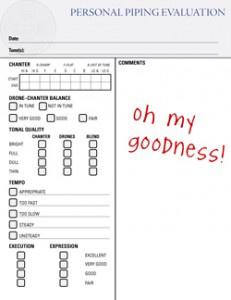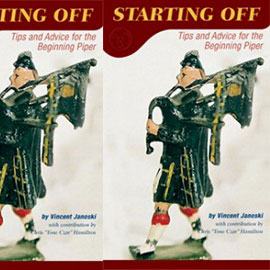Hacking Your Inner Bagpiping Judge
 There are those who would claim Highland piping is difficult. It may be, but perfecting a crunluath a-mach is nothing compared to the art of perfecting your own self-critiquing skills. It is the hardest thing of all to become your own judge and lend an objective ear to your own playing. After running through your repertoire a number of times, it may well be impossible to get a sense of how well, or how poorly, you are doing. Time to put yourself in the judge’s seat and subject yourself to…yourself.
There are those who would claim Highland piping is difficult. It may be, but perfecting a crunluath a-mach is nothing compared to the art of perfecting your own self-critiquing skills. It is the hardest thing of all to become your own judge and lend an objective ear to your own playing. After running through your repertoire a number of times, it may well be impossible to get a sense of how well, or how poorly, you are doing. Time to put yourself in the judge’s seat and subject yourself to…yourself.
Ultimately, you are your own best piping judge. Our personal goals and sense of progress is what keeps us moving, not necessarily wins, or lack thereof, on games day. One trick to train yourself in the art of self-judging involves simply recording your playing and giving a listen as a member of an audience—as if you were at a major solo piping contest watching from the crowd.
This is not as silly as it sounds. When we focus and listen, our focus in those areas that are typically engaged in playing bagpipes is greater and projected outward. We are attuned to the performer in a way that is impossible to bring to bear during our own playing sessions. In fact, there is research to suggest that our understanding of music is processed differently when “active†(i.e., playing) or “passive†(i.e., listening).
Pretending to be part of the audience, or in this case the judge, will focus your attention on areas that may get lost during your rehearsals. Think about it. A judge is sitting, focussed on you and the various aspects of your performance: tone and tuning, tempo and timing, phrasing and expression—all the things you are practicing. But what is the judge really hearing? When you felt you may have deserved that prize, but didn’t get it, can you be sure you assessed your own performance accurately?
Create your own personal piping evaluation sheets much like you would be given at the end of a day of solo competition. Or, download blank piping evaluation sheet for light music and piobaireachd right here. Make several copies, turn on your recording media of choice, sit back, and listen to your recorded tunes. Evaluate your playing and pick yourself apart as a judge might do. How is your chanter tone? Are your drones steady? Really listen. Make notes on your personal score sheet as if you are the judge. Not only will you learn to assess your own skills objectively, but you may notice areas needing improvement (or areas that are coming along nicely!) that would have been missed in the hubbub of your rehearsal.
Record several days of practice and do this once per week. You will amass quite the record of your opinions about your playing. Before long, you will train your ear to pick up the weak areas, as well as recognize your strengths, while you are playing. Give it enough time and you will gain a more accurate picture of yourself as a player. Being honest with yourself will keep you on the path of creative progress.
-
Joe Korber
 Pipehacker
Pipehacker







